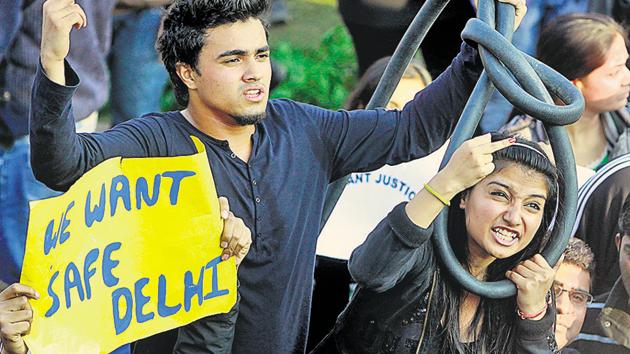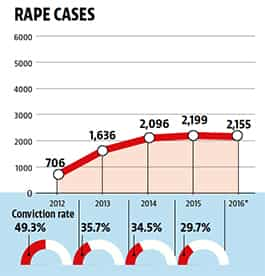5 years of Delhi gang rape: Conviction for rape stays poor despite special courts, new law
The National Crime Records Bureau data shows that since 2012 when the brutal gang rape of a student shook the country, the conviction rate in rape cases dropped even though the number of cases went up
A flagging legal system that is unable to keep up with the pressures of increased reporting of cases, shortage of judges, victims turning hostile, and false allegations have resulted in a steady decline in conviction rates for rape in Delhi, despite amended laws, fast track courts and increased awareness about the issue, says experts.

According to the National Crime Records Bureau (NCRB), the number of rape cases reported in the Capital almost tripled from 706 in 2012 to 2,199 in 2015 and 2,155 in 2016. The police have attributed the ease of registering cases and increased sensitivity to them for the ‘positive trend’.
However the conviction rate has been dropping steadily from 49.3% in 2012 to 35.7% in 2013, 34.5% in 2014 and 29.7% in 2015. The NCRB is yet to release the data for 2016.
Ranjana Kumari, one of the many experts in the field who had presented arguments before the Justice Verma Commission that was set up post December 16, 2012, gang rape case, said procedural delays are the major reasons behind low conviction rates.
“Even in the December 16 case, if you talk to the mother, she will tell you that she is still waiting for justice. They claim we have fast track courts, but there isn’t anything fast about them. A major consequence of the delayed process is that the victim many a times, loses faith and turns hostile,” she said.
A police officer in Chennai had allegedly demonstrated that with delay there were less chances of conviction, according to retired Delhi High Court Chief Justice AP Shah, as the prosecution’s ability to get witnesses reduces and the chances of tampering with evidence increases.
So, what causes the delay? One reason that many point to is the high reporting, and the increased flow of cases to these fast tack courts.

“We definitely need more judges, recruited and promoted based on adherence to constitutional values like women’s freedom. Justice Gita Mittal has been bringing more focus to gender trainings once they are in. Though the lower courts are doing better, the high court becomes a bottleneck,” said Karuna Nundy, a noted lawyer.
Justice Shah finds some “substance to this argument”.
“There is increased pressure, and we definitely have few judges. If you take the judge to population ratio or even judge to crime ratio, it is not promising. We have failed miserably in introducing a case management system... The high court is also definitely a bottleneck, but it is everywhere. There is a paucity of judges, especially those that deal with criminal cases,” said Justice Shah, who added that you would find minimum number of benches handling criminal cases in the high courts.
The retired judge, who has also served as the chairperson of the Law Commission of India, also said that fast-track courts did not have the desired result. The fast-track courts which were supposed to help give victims faster respite do not always follow due process, according to Justice Shah.
This makes their sentences less immune to challenges, says Nundy.
The police and the prosecution have also been held responsible for the dip in conviction. While Kumari spoke of how the police submit “bad reports” without “proper investigation,” Shah spoke of “false prosecution”.
The Delhi Police, however, said as they are now obligated to register and chargesheet any complaint that a woman raises because of the changed legislation, they cannot filter out false allegations, thereby driving the conviction rates down.
“Also, in Delhi, in around 97% of the rape cases, the victim and the accused know each other. They may be neighbours, friends, family members or relatives, so sometimes the victim also rescinds their statement in court,” said Madhur Verma, the Delhi Police spokesperson.
Whatever the reason, one concurs that it needs to be fixed. Shah probably sums it up best, calling for a detailed study into the reasons for different acquittals.
“Criminal justice is on the verge of collapse. (Because of the delays and it’s consequences) in the long run, the people suffer. The victims lose faith in the system. And the innocent accused languishes in jail,” he said.




